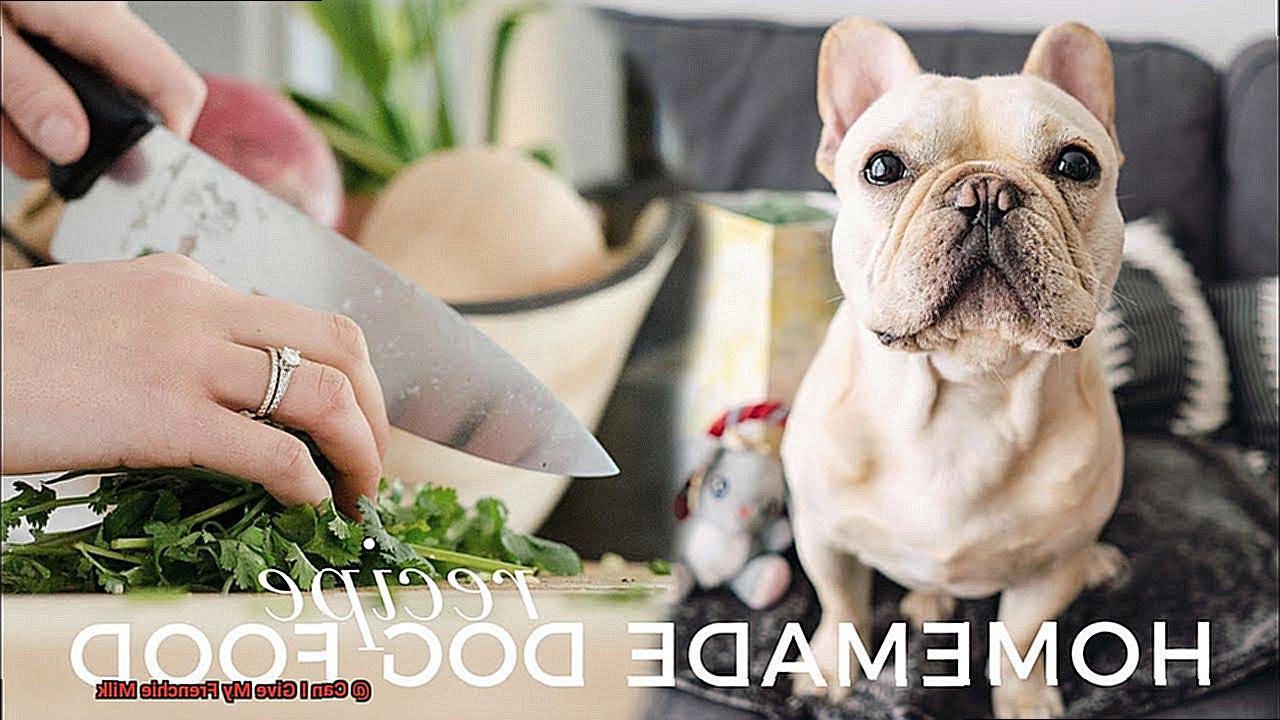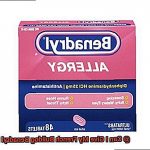Can I Give My Frenchie Milk?
French Bulldogs, those adorable little creatures with their unique ears and irresistible personalities, have found a special place in our hearts as beloved companions. As devoted pet parents, we always strive to provide them with the best care, including their diet. But here’s a question that may have crossed your mind: Can I give my Frenchie milk?
Milk, that creamy delight we enjoy ourselves, seems like a tempting treat to share with our four-legged pals. However, when it comes to French Bulldogs, things aren’t as simple as they appear. While milk might seem harmless, it can actually cause digestive issues and other health problems for certain dogs.

To make an informed decision about giving milk to French Bulldogs, it’s important to consider both the advantages and disadvantages. On one hand, milk is packed with calcium and protein – essential nutrients for growth and bone health. It can also serve as a reward during training sessions or other moments where positive reinforcement is needed.
But hold on. Most adult dogs are lactose intolerant – including our beloved Frenchies. Lactose, the sugar found in milk, requires an enzyme called lactase for proper digestion. As dogs grow older, their lactase production decreases, often leading to uncomfortable symptoms like gas, diarrhea, and upset tummies.
In this comprehensive blog post, we’ll dive deeper into why milk may not be suitable for French Bulldogs and explore alternatives worth considering. We’ll also touch on feeding milk to French Bulldog puppies (because they’re just too cute.) and emphasize the importance of consulting with your veterinarian before making any dietary changes.
So join us on this journey as we unravel the dairy dilemma and find the best nutritional choices for our cherished French Bulldogs – ensuring their long-term well-being and happiness along the way.
Is Milk Safe for French Bulldogs?
Contents
- 1 Is Milk Safe for French Bulldogs?
- 2 Why is Milk Problematic for French Bulldogs?
- 3 What Are the Potential Side Effects of Feeding Milk to French Bulldogs?
- 4 Is There an Alternative Source of Calcium for French Bulldogs?
- 5 How Can You Tell if Your Frenchie is Allergic or Sensitive to Milk?
- 6 Should I Consult a Veterinarian Before Giving My Frenchie Milk?
- 7 What Foods and Beverages Are Safe For French Bulldogs?
- 8 Tips on Transitioning Your Frenchie From Milk to Other Sources of Nutrition
- 9 Conclusion
French Bulldogs are beloved companions known for their distinctive appearance and charming personalities. As responsible pet owners, it’s crucial to understand what foods and beverages are safe for these adorable little pooches.
One common question that arises is whether it is safe to give French Bulldogs milk. In this article, we will delve into the topic and provide you with all the information you need to keep your furry friend healthy and happy.
Understanding Lactose Intolerance in French Bulldogs:
French Bulldogs, like many other dogs, can be lactose intolerant. Lactose intolerance occurs when a dog lacks the enzyme lactase necessary to properly digest lactose, the sugar found in milk. Consuming milk can lead to gastrointestinal upset, including symptoms such as diarrhea, gas, bloating, and stomach discomfort.
Sensitive Stomachs and Allergies:
In addition to lactose intolerance, French Bulldogs have sensitive stomachs and can be prone to food allergies or sensitivities. Dairy products like milk can trigger allergic reactions in some dogs, resulting in itching, skin rashes, or digestive issues. It’s essential to monitor your Frenchie closely and consult with a veterinarian if you suspect any allergic reactions or sensitivities.
Exercise Caution and Consult Your Veterinarian:
While some French Bulldogs may tolerate small amounts of milk without any issues, it’s always best to err on the side of caution. Before introducing milk or any new food into your Frenchie’s diet, consult with your veterinarian. They can provide personalized advice based on your dog’s health history and individual needs.
Alternatives for Calcium Intake:
If you’re looking for alternative sources of calcium for your Frenchie, there are plenty of options available. Commercial dog foods are formulated to provide all the essential nutrients your dog needs, including calcium. Additionally, specific dog-friendly calcium supplements can be recommended by your veterinarian.
Why is Milk Problematic for French Bulldogs?
However, when it comes to their diet, there are certain foods that can be problematic for them. One such food is milk. In this article, we will explore the reasons why milk is problematic for French Bulldogs and provide you with alternative sources of calcium to keep your furry friend healthy and happy.
Lactose Intolerance: A Common Issue
One of the main reasons why milk is problematic for French Bulldogs is because they are often lactose intolerant. Lactose is a sugar found in milk that requires an enzyme called lactase to be properly digested. However, many French Bulldogs lack sufficient amounts of lactase, making it difficult for them to break down lactose. This can result in digestive issues such as bloating, gas, diarrhea, and stomach discomfort.
- Upset Stomach: Even if a French Bulldog is not lactose intolerant, milk can still cause an upset stomach. The high fat content in milk can be difficult for dogs to digest, leading to gastrointestinal problems. This can manifest as vomiting, diarrhea, or general discomfort.
- Allergies: Some French Bulldogs may be allergic to milk or certain components of it, such as proteins like casein or whey. Allergic reactions can range from mild symptoms like itchiness and skin rashes to more severe reactions like difficulty breathing or swelling. If a French Bulldog shows signs of an allergy after consuming milk, it is important to consult a veterinarian for further guidance.
- Obesity: Milk is relatively high in calories and fat content, which can contribute to weight gain and obesity in French Bulldogs. These dogs are already prone to weight issues due to their breed’s tendency to gain weight easily. Providing them with additional calories from milk can exacerbate this problem and lead to health issues such as joint problems and heart disease.
- Calcium Imbalance: While milk is often associated with being a good source of calcium, it is important to note that French Bulldogs have specific dietary requirements when it comes to calcium intake. Too much calcium from sources like milk can lead to imbalances and potentially contribute to conditions like skeletal abnormalities or urinary tract problems.
Alternative Sources of Calcium
Now that we understand why milk is problematic for French Bulldogs, let’s explore some alternative sources of calcium that are safe and beneficial for them:

- Commercial Dog Food: Many commercial dog foods are formulated to meet the specific nutritional needs of different dog breeds, including French Bulldogs. These foods often contain the right balance of nutrients, including calcium, to support their overall health.
- Calcium Supplements: If you’re concerned about your French Bulldog’s calcium intake, you can consider adding a calcium supplement to their diet. However, it is important to consult with your veterinarian before introducing any new supplements to ensure they are appropriate for your dog’s specific needs.
What Are the Potential Side Effects of Feeding Milk to French Bulldogs?

French Bulldogs are beloved companions known for their charming personalities and unique physical characteristics. As responsible pet owners, we want to ensure that our furry friends stay healthy and happy. While it may be tempting to share a bowl of milk with your French Bulldog, it’s crucial to understand the potential side effects that can arise from this seemingly harmless act. In this article, we will explore the risks associated with feeding milk to French Bulldogs and provide alternative options for maintaining their well-being.
Digestive Issues:
French Bulldogs, like many other dog breeds, are lactose intolerant. Lactose, a sugar found in milk, requires an enzyme called lactase to be properly digested. Unfortunately, French Bulldogs lack sufficient amounts of this enzyme, leading to digestive problems such as diarrhea, bloating, and gas. These issues can cause discomfort and distress for your furry companion.
Allergic Reactions:
Milk can also trigger allergic reactions in French Bulldogs. Symptoms may include itching, skin rashes, ear infections, or more severe reactions like difficulty breathing or facial swelling. Identifying these signs promptly is crucial to prevent further complications and provide appropriate treatment if necessary.
Weight Gain and Obesity:
Feeding milk to French Bulldogs can contribute to weight gain and obesity. Milk is high in calories and fat content, which can easily tip the scales in favor of excess weight. Coupled with their low exercise needs and tendency to overeat, French Bulldogs are particularly susceptible to weight-related health issues. It is essential to maintain a balanced diet that doesn’t include milk to help prevent obesity and its associated risks.
Calcium Imbalance:
While milk is often considered a good source of calcium, the calcium content in cow’s milk is not ideal for dogs. Excessive calcium intake can lead to skeletal abnormalities in growing puppies or contribute to conditions like bladder stones in adult dogs. Consulting with a veterinarian about alternative sources of calcium, such as commercial dog food or calcium supplements, is recommended to ensure your French Bulldog’s bone health.
Disruption of Gut Bacteria:
Milk can disrupt the balance of beneficial bacteria in a French Bulldog’s gut, leading to digestive issues and an increased risk of infections. Maintaining a healthy gut microbiome is crucial for overall health and well-being, and avoiding milk can help preserve this delicate balance in your furry friend.
Is There an Alternative Source of Calcium for French Bulldogs?
French Bulldogs are known for their lovable personalities and unique charm. As responsible pet owners, it’s our duty to ensure that they receive a balanced and nutritious diet. Calcium is an essential nutrient for French Bulldogs, as it promotes healthy bone and teeth development. While many of us may reach for a glass of milk as a source of calcium, it’s important to note that this may not be the best choice for our furry friends.
Lactose Intolerance: A Common Issue
French Bulldogs, like many other dog breeds, can be lactose intolerant. Lactose is a sugar found in milk that many dogs cannot digest properly. Feeding milk to a lactose-intolerant French Bulldog can lead to digestive issues such as diarrhea, gas, and bloating. While not all French Bulldogs are lactose intolerant, it is a common condition in the breed. So, what are the alternatives?
Dairy Products with Lower Lactose Content
If you’re looking for dairy options, there are alternatives with lower lactose content that can be easier for French Bulldogs to digest. Yogurt, cheese, and cottage cheese are all calcium-rich options that may be suitable for your Frenchie. These dairy products have undergone fermentation processes that break down lactose, making them more tolerable for dogs.
Calcium Supplements: A Convenient Option
Another alternative is to incorporate calcium supplements into your French Bulldog’s diet. These supplements usually come in the form of chewable tablets or powder that can be sprinkled over their food. However, it is crucial to consult with a veterinarian before adding any supplements to your Frenchie’s diet to ensure the proper dosage and suitability for your individual dog.
Fruits and Veggies: Nature’s Calcium Sources
Nature provides us with an abundance of calcium-rich fruits and vegetables that can benefit our French Bulldogs. Incorporating finely chopped or pureed fruits and veggies into their meals can provide them with the necessary calcium. Broccoli, kale, spinach, and oranges are all excellent options to consider.
Commercial Dog Food: A Convenient Choice
Lastly, many high-quality commercial dog food brands formulated specifically for French Bulldogs include added calcium. When choosing a dog food for your Frenchie, look for reputable brands that meet the nutritional needs of the breed.
How Can You Tell if Your Frenchie is Allergic or Sensitive to Milk?
As an expert on French Bulldogs, I’ve seen my fair share of allergies and sensitivities, including those to milk. In this article, I’ll break down how you can tell if your Frenchie is allergic or sensitive to milk, so you can keep their bellies happy and their tails wagging.
Watch for Skin Reactions:
If your Frenchie is allergic to milk, they may experience skin irritations like itching, redness, or hives. Keep a close eye on their skin condition after consuming milk or dairy products. Excessive scratching or licking of paws can also be a sign of an allergic reaction.
Observe Digestive Issues:
Sensitivities to milk can result in digestive problems for Frenchies. Keep an eye out for diarrhea, vomiting, or excessive gas after they consume milk. These symptoms may indicate that your Frenchie has trouble digesting lactose.
Monitor Behavior and Appearance:
Changes in behavior or physical appearance can be indicative of an allergy or sensitivity. If your Frenchie becomes lethargic, has a dull coat, or experiences weight loss after consuming milk, it may be a sign of an adverse reaction.
Conduct an Elimination Diet:
If you suspect that your Frenchie is allergic or sensitive to milk, consult with a veterinarian. They may recommend conducting an elimination diet to pinpoint the specific cause of the reaction. This process involves removing milk and dairy from your Frenchie’s diet for a period of time and reintroducing it later to observe any changes in their condition.
Remember, every Frenchie is unique. While some may have clear signs of milk allergies or sensitivities, others may not show any adverse reactions at all. It’s always best to consult with a veterinarian to get a proper diagnosis and guidance on your Frenchie’s diet.
Should I Consult a Veterinarian Before Giving My Frenchie Milk?
French Bulldogs, or Frenchies as they are affectionately known, are popular and beloved pets. As a responsible pet owner, you want to provide your Frenchie with the best care and nutrition. But when it comes to giving them milk, it’s important to pause and consult a veterinarian first. In this article, we will explore the reasons why seeking professional advice is crucial before introducing milk into your Frenchie’s diet.
Lactose Intolerance:
Like many dog breeds, Frenchies can be lactose intolerant. Lactose is a sugar found in milk, and dogs with lactose intolerance lack the necessary enzymes to properly digest it. Feeding milk to a lactose-intolerant Frenchie can lead to digestive issues such as diarrhea, gas, and bloating. Consulting a veterinarian will help you determine if your Frenchie has this intolerance and avoid potential discomfort.
Nutritional Needs:
French Bulldogs have specific dietary requirements that need to be met for optimal health. While milk may seem like a good source of calcium, it can also be high in fat and calories. Overfeeding milk to your Frenchie can result in weight gain and obesity, which can lead to various health problems. A veterinarian can assess your Frenchie’s individual needs and recommend alternative sources of calcium and nutrients that are better suited for their overall well-being.
Prevention of Health Issues:
By consulting a veterinarian before introducing milk into your Frenchie’s diet, you can prevent potential health issues down the road. Professionals have the knowledge and expertise to identify any underlying conditions or sensitivities that could be exacerbated by milk consumption.
They can guide you on the appropriate diet for your Frenchie, ensuring they receive a balanced and suitable nutrition plan.
What Foods and Beverages Are Safe For French Bulldogs?
French Bulldogs are adorable and lovable companions that deserve the best care, including a proper diet. As an expert in French Bulldog nutrition, I’m here to share my insights on what foods and beverages are safe for these little cuties. Let’s dive right in.
Hydration is Key:
Water is essential for your French Bulldog’s health and well-being. Make sure they always have access to clean and fresh water. Hydration helps with digestion and overall body function.
Commercial Dog Food:
High-quality commercial dog food formulated specifically for French Bulldogs is a convenient and reliable option. Look for brands that cater to their unique needs, including sensitive digestion, allergies, and weight management.

Homemade Meals:
If you prefer homemade meals, consult with a veterinarian or canine nutritionist to ensure your Frenchie’s meals are well-balanced and meet their nutritional requirements. Include lean proteins like chicken or turkey, carbohydrates like rice or sweet potatoes, healthy fats, and a variety of fruits and vegetables.
Safe Human Foods:
While some human foods can be shared with French Bulldogs in moderation, others should be avoided. Safe options include cooked lean meats (without seasoning), plain cooked rice or pasta, eggs (fully cooked), and certain fruits and veggies like blueberries, apples (without seeds), carrots, and green beans.

Foods to Avoid:
Certain foods can be toxic or harmful to French Bulldogs. Never give them chocolate, onions, garlic, grapes, raisins, avocados, or nuts. These can cause serious health issues and should be kept away from your Frenchie’s reach.
Dairy Dilemma:
While some dogs can tolerate small amounts of milk, many French Bulldogs are lactose intolerant. Opt for lactose-free options made specifically for dogs if you want to give them dairy products, such as milk or cheese.
Tips on Transitioning Your Frenchie From Milk to Other Sources of Nutrition
While milk can be given to puppies in their early weeks, it is not a suitable long-term source of nutrition for adult dogs like French Bulldogs. In this blog post, we will provide you with some helpful tips on how to make this transition smooth and successful.
Gradually Introduce Solid Foods:
It is important to gradually introduce solid foods to your Frenchie’s diet to avoid any sudden changes that could upset their stomach. Start by mixing small amounts of soft, easily digestible foods like mashed vegetables or puppy formula mixed with kibble. This will help your Frenchie adjust to the new textures and flavors.
Monitor Their Reaction:
Pay close attention to how your Frenchie reacts to the new foods. If they seem reluctant or disinterested, try adding some low-sodium chicken broth or a small amount of plain yogurt for added flavor. It’s important to note any signs of adverse reactions such as vomiting, diarrhea, or excessive itching, which could indicate allergies or sensitivities.
Consult with Your Veterinarian:
Every Frenchie is unique, and their dietary needs may vary. It’s always a good idea to consult with your veterinarian for guidance on specific dietary needs and recommended transition methods for your Frenchie. They can provide tailored advice based on your Frenchie’s age, weight, and any special dietary requirements.
Choose High-Quality Puppy Food:
To ensure a balanced diet for your Frenchie, choose a high-quality puppy food that meets their nutritional needs. Look for brands that prioritize real meat as the main ingredient and avoid fillers or artificial additives. Your veterinarian can recommend specific brands that are suitable for your Frenchie.

Make Mealtime Engaging:
To make mealtime more enjoyable for your Frenchie, consider using food puzzles or interactive toys. These can help stimulate their minds and encourage them to eat. Additionally, ensure that your Frenchie has access to fresh water at all times to stay hydrated and aid in digestion.
DR6IFTfYNRQ” >
Conclusion
In conclusion, it is not recommended to give your Frenchie milk.
While they may enjoy the taste, their digestive system is not equipped to properly process lactose. This can lead to digestive issues such as diarrhea, gas, and bloating.
Additionally, some Frenchies may be lactose intolerant, making milk consumption even more problematic. It’s always best to stick to a balanced diet specifically formulated for your Frenchie’s nutritional needs.
If you have any concerns or questions about your Frenchie’s diet, consult with your veterinarian who can provide personalized guidance.




